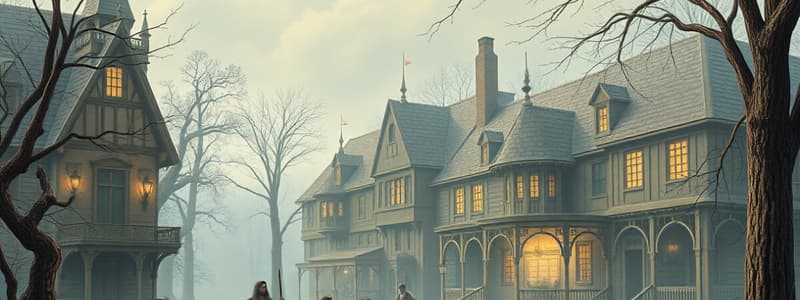Podcast
Questions and Answers
William Penn was part of a religious group called ______________.
William Penn was part of a religious group called ______________.
Quakers
Penn started a colony called __________________.
Penn started a colony called __________________.
Pennsylvania
______________ means 'City of Brotherly Love.'
______________ means 'City of Brotherly Love.'
Philadelphia
Penn wanted the people in his colony to be able to have simple lives, religious freedom, and ______________.
Penn wanted the people in his colony to be able to have simple lives, religious freedom, and ______________.
Pennsylvania's self-government lasted ______________.
Pennsylvania's self-government lasted ______________.
_______________ wanted his colony to be a model to the rest of the world.
_______________ wanted his colony to be a model to the rest of the world.
Many __________________ moved to Pennsylvania.
Many __________________ moved to Pennsylvania.
Penn advertised the good soil and climate, and colonists came from all over ______________.
Penn advertised the good soil and climate, and colonists came from all over ______________.
The colonists in Pennsylvania bought land from the _____________ _____________.
The colonists in Pennsylvania bought land from the _____________ _____________.
The Germans brought good farming techniques and _____________ skills.
The Germans brought good farming techniques and _____________ skills.
In the early 1600's Penn started his colony called ___________.
In the early 1600's Penn started his colony called ___________.
Penn called the capital of his colony ______________.
Penn called the capital of his colony ______________.
The government of Pennsylvania was much like a _____________, where people made decisions by voting.
The government of Pennsylvania was much like a _____________, where people made decisions by voting.
Pennsylvania was started so the ______________ would have a safe place to live.
Pennsylvania was started so the ______________ would have a safe place to live.
Pennsylvania was a successful colony because the land was good for ______________.
Pennsylvania was a successful colony because the land was good for ______________.
Flashcards
Who were the Quakers?
Who were the Quakers?
A religious group that William Penn was a part of.
What is Pennsylvania?
What is Pennsylvania?
The colony started by William Penn.
What does Philadelphia mean?
What does Philadelphia mean?
Means 'City of Brotherly Love.'
What 3 three things did Penn want for his colony?
What 3 three things did Penn want for his colony?
Signup and view all the flashcards
How long did Pennsylvania's self-government last?
How long did Pennsylvania's self-government last?
Signup and view all the flashcards
Who was Penn?
Who was Penn?
Signup and view all the flashcards
Who were the Germans?
Who were the Germans?
Signup and view all the flashcards
Where did the colonists that moved to Pennsylvania originate from?
Where did the colonists that moved to Pennsylvania originate from?
Signup and view all the flashcards
Who were the Native Americans?
Who were the Native Americans?
Signup and view all the flashcards
What did the Germans bring to Pennsylvania?
What did the Germans bring to Pennsylvania?
Signup and view all the flashcards
What is Pennsylvania?
What is Pennsylvania?
Signup and view all the flashcards
What is Philadelphia?
What is Philadelphia?
Signup and view all the flashcards
What is a Democracy?
What is a Democracy?
Signup and view all the flashcards
Why was Pennsylvania started?
Why was Pennsylvania started?
Signup and view all the flashcards
Why was Pennsylvania a successful colony?
Why was Pennsylvania a successful colony?
Signup and view all the flashcards
Study Notes
William Penn and the Quakers
- William Penn was associated with the religious group known as Quakers.
- He founded a colony to promote religious freedom and simple living.
Creation of Pennsylvania
- Penn established the colony named Pennsylvania.
- The capital city of Pennsylvania is Philadelphia, meaning "City of Brotherly Love."
Governance
- Penn aimed for his colony to reflect a fair government and serve as a model for others.
- Pennsylvania operated under a self-governing system until the American Revolution, resembling a democracy where citizens made decisions through voting.
Population and Immigration
- A significant number of Germans migrated to Pennsylvania, bringing advanced farming techniques and skilled craftsmanship.
- Penn advertised the colony's fertile soil and favorable climate, attracting settlers from across Europe.
Native American Relations
- Colonists in Pennsylvania engaged in land purchases from Native Americans, highlighting early interactions and agreements between the two groups.
Agricultural Success
- The colony thrived primarily due to its productive land, well-suited for farming.
Studying That Suits You
Use AI to generate personalized quizzes and flashcards to suit your learning preferences.



